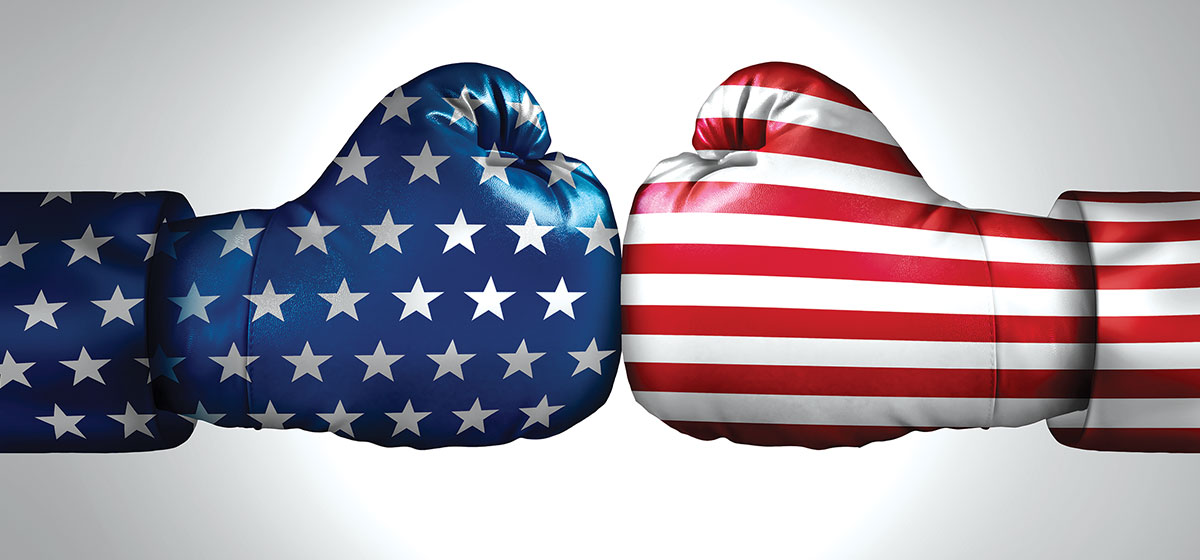Civil Discourse

As I consider the divided state of our country, I imagine my father’s voice repeating an old adage to me. “If you’re not part of the solution, you’re part of the problem.”
We can all agree that America has problems, though we’ll likely differ on what they are. Some will say the mob that former President Trump unleashed on our Capitol exemplifies the dangerous, unhinged right-wingers hell-bent on subverting our institutions. Others say woke progressive ideologues are creating an Orwellian socialism that threatens our basic freedoms. Many will cite the pandemic, racism, China, wealth disparity, or perhaps the exploding national debt.
The biggest underlying problem today, as far as I have the power to perceive it, is that too many people think they’re right and that the other guy is not only dead wrong, but he is so wrong that when he voices his contrary opinion, he should be shouted down — or shamed out of the public dialogue entirely.
It seems we are becoming what the great jazz musician Woody Herman called his big band — The Thundering Herd. But instead of making music, our gig has too often become trampling those who would disagree with us. Or, in the new vernacular, canceling them.
It’s likely that I’m particularly sensitive about protecting freedom of expression because I’ve spent my entire career as a journalist — interviewing people and writing stories that some call “the first draft of history.” You learn pretty quickly that “the truth” often has as many facets as you have the ability to comprehend.
And anyone who has ever tried to solve the complex problems that bedevil our cities and country knows that they require the best thinking and efforts — of all sides. We all benefit when the marketplace of ideas is free and open. Yes, it’s inefficient and there’s a good bit of sound and fury. But it’s what makes us different from China. It’s the essence of America.
Aristotle put it more succinctly. Everyone has a piece of the truth. The problem is people often think their piece is the whole truth.
I got a group email recently from a liberal friend who recalled an old boss who insisted that he be able to present a coherent argument that his opponent might make. In that spirit, he wrote a little essay entitled “Why I should be a Conservative.” He didn’t believe it, but he made the effort.
I told him I was writing a column on the subject and thought his piece would make a nice companion piece, provided I could get a conservative friend to write “Why I should be a Liberal.” The conservative friend wouldn’t do it, however, out of concern that he would be “canceled.”
Our Constitution, of course, is set up to protect against such situations. U.S. history students will recall the Federalist Papers, and specifically Federalist # 10, which discusses the danger of tyrannical political factions and describes the “violence of factions” as the “mortal disease” of popular governments.
Niccolo Machiavelli knew that too. The 15th century political philosopher is best known for “The Prince,” his ruthless little handbook for would-be rulers that says the ends justify the means and it’s better to be feared than loved. His greatest contribution, however, and the reason that is he the real father of our form of government is found in his “Discourses.” It’s human nature that ambitious people will try to usurp power and subjugate others. So Machiavelli meticulously created the complex system of checks and balances, which ultimately became our government.
America has been carefully designed to handle times like these, when great stresses, divisions and disagreements threaten to tear us asunder. And for 245 years, we have moved between the two great poles of politics — liberty and equality. If you have too much of one, you end up having too little of the other.
The best societies — and despite its shortcomings, America is the best in history — have always found this balance through robust debate and even disagreement — e pluribus unum.
However, the essential foundation for such constructive debate is respect for one’s opponent and his right to disagree.
So if you ever find yourself jumping on a bandwagon and personally attacking your opponent — excoriating, shaming or denigrating him or her — ask yourself whether the real problem in America just might be you.





